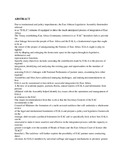| dc.description.abstract | Due to institutional and policy impediments, the East African Legislative Assembly (hereinafter referred
to as “EALA”) remains ill equipped to drive the much anticipated process of integration of East Africa.
The Treaty establishing East Africa Community (referred to as ‘EAC” hereafter) fails to provide for
clear linkage between the people of East Africa and the EALA, a fundamental organ that ought to be at
the center of the project of amalgamating the Nations of East Africa. EALA ought to play its rightful
role by shaping and enlarging the democratic space in the region through its legislative, deliberative and
representative functions.
Specific study objectives include; assessing the contribution made by EALA to the process of regional
integration, identifying and analyzing the existing gaps and opportunities in the mandate of EALA,
assessing EALA’s linkages with National Parliaments of partner states, examining how other regional
Assemblies and blocs have addressed emerging challenges, and making recommendations on how
EALA can be customized to best deliver successful integration for East Africa.
A Review of academic papers, journals, books, annual reports of EALA and information from persons
affiliated with the Assembly helped identify key issues about the operations and management of EALA
in relation to the EAC.
One major recommendation from this work is that the Secretary General of the EAC recommends to the
Council of Ministers the formation of a multi-sectoral taskforce that will undertake a wholesome review
of the legal and institutional foundation of EALA and prepare a policy and legislative framework on the
strategic shift towards a political federation for EAC and to specifically look at how best EALA can be
structured to make it more assertive and effective in the integration process with the capacity to exercise
greater oversight over the summit of Heads of States and the East African Court of Justice (the “EACJ”
hereafter); The taskforce will further explore the possibility of EAC partner states conducting direct
elections for EALA members by universal suffrage and suggest mechanisms to promote greater
appreciation of the integration process by the citizens of East Africa. Finally, the taskforce ought to
recommend a system of linking partner state national legal and Governance systems with those of the
EALA and how to effectively monitor and evaluate the regional integration progress. Alternatively, a
member of EALA may initiate this process by way of a motion introduced in the Assembly that would
culminate into a resolution urging the formation of such a taskforce by the Council of Ministers | en |


